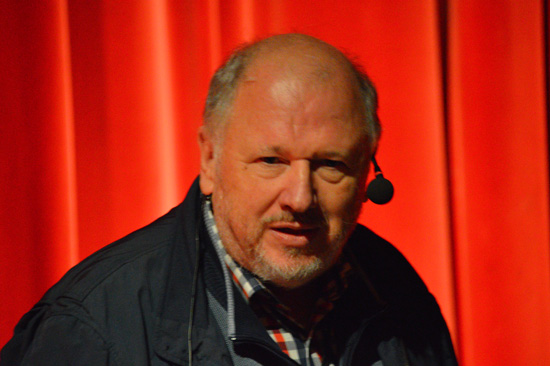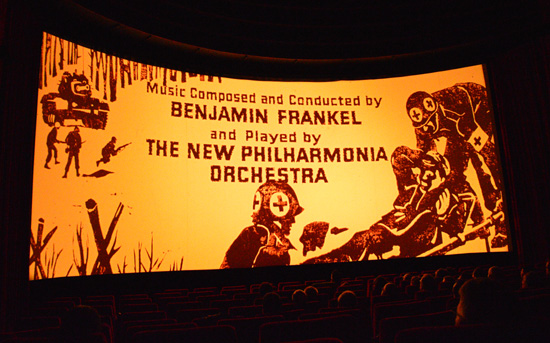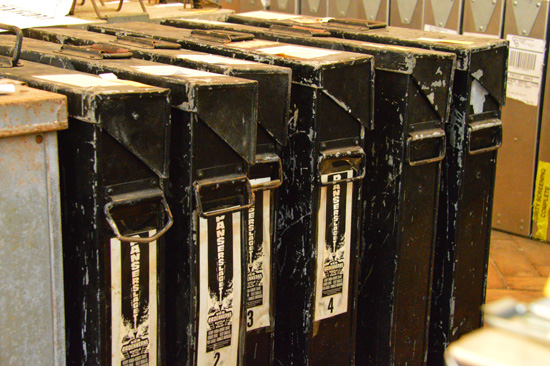Battle of the Bulge |
Read more at in70mm.com The 70mm Newsletter |
| Written by: Udo Heimansberg, Dusseldorf, Germany | Date: 18.10.2015 |
 Udo
Heimansberg introducing "Battle of the Bulge". Image Thomas Hauerslev Udo
Heimansberg introducing "Battle of the Bulge". Image Thomas HauerslevThe 11. Todd-AO 70mm-Festival in Karlsruhe and a screening of "BATTLE OF THE BULGE" in Cinerama gave me the opportunity to talk about the film's composer, Benjamin Frankel, before the movie starts. "Battle of the Bulge" was a great score. He really understood every element of the orchestra and he didn’t need a vast string section to make it sound good … [The producers] wanted a British composer and they asked me for my recommendation … [Ben] was the most likely to be able to turn out a big score and an intelligent one. Ken Annakin Benjamin Frankel (31 January 1906 – 12 February 1973): His best known pieces include a cycle of five string quartets, eight symphonies, and several concertos for violin and viola. His single best-known piece is probably the First Sonata for Solo Violin, which, like his concertos, resulted from a long association with Max Rostal. During the last 15 years of his life, Frankel also developed his own style of 12-note composition which retained contact with tonality (the style in which "BATTLE OF THE BULGE" was written). Frankel was born in London on 31 January 1906, the son of Polish-Jewish parents. He began to learn the violin at an early age, showing remarkable talent; at age 14, his piano-playing gifts attracted the attention of Victor Benham, who persuaded his parents to let him study music full-time. He spent six months in Germany in 1922, then returned to London, where he won a scholarship from the Worshipful Company of Musicians and attempted his first serious compositions while earning his income as a jazz violinist, pianist and arranger. Known then as Ben (or Benny) Frankel, his jazz work can be heard on recordings by Fred Elizalde's band. |
More in 70mm reading: "What's On" with Udo Heimansberg Das Vergessene Tal In Innsbruck Tonhallen We saw NAPOLEON on Sunday in Amsterdam Ken Annakin. Director in Todd-AO and Ultra Panavision 70. 11. Todd-AO 70mm-Festival 2015 Internet link: jpc.de unitedimg.com Metropol Düsseldorfer Filmkunstkino GmbH HRB 34556, Amtsgericht Düsseldorf Germany filmkunstkinos.de Listen to "Battle of the Bulge" |
 By the early 1930s, Frankel was in demand as an arranger and musical
director in London, working with several dance bands. He wrote several
popular dance band arrangements for Henry Hall's BBC Dance Orchestra,
including "Learn To Croon", "Don't Blame Me", "Weep No More My Baby", "April
In Paris" and "In Town Tonight". He wrote many arrangements and scores for
theatre and film music but gave up theatre work in 1944. He did, however,
retain an interest in film composing until his death, writing over 100
scores. Beside that he wrote music for documentaries and commercials. Among
his filmscores were: The Importance Of Being Earnest, The Curse Of The
Werewolf, The Man In The White Suit, The Night Of The Iguana and The
Old Dark House. By the early 1930s, Frankel was in demand as an arranger and musical
director in London, working with several dance bands. He wrote several
popular dance band arrangements for Henry Hall's BBC Dance Orchestra,
including "Learn To Croon", "Don't Blame Me", "Weep No More My Baby", "April
In Paris" and "In Town Tonight". He wrote many arrangements and scores for
theatre and film music but gave up theatre work in 1944. He did, however,
retain an interest in film composing until his death, writing over 100
scores. Beside that he wrote music for documentaries and commercials. Among
his filmscores were: The Importance Of Being Earnest, The Curse Of The
Werewolf, The Man In The White Suit, The Night Of The Iguana and The
Old Dark House.Frankel also became widely known as a serious composer after World War II; his first work to gain fame was the violin concerto dedicated "in memory of 'the six million'", a reference to the Jews murdered during the Holocaust, commissioned for the 1951 Festival of Britain and first performed by Max Rostal. From 1941 till 1952 he was a member of the British Communist Party, but resigned his membership in protest at the Prague show-trials. The music for BATTLE OF THE BULGE was his only score recorded in full stereophonic sound- and also his last one! He made intense use of multichannel possibilities: the main title featured the “Tank men´s song” performed prominently by a solo tuba (a tank commander, Kurt Wiehle, wrote the lyrics in 1935 using a tune from the 19th century: Luiska-Lied (Wohl über den Klippen) sung by whalers. It is also used by the Légion Étrangère as “Képi Blanc” and still sung by the German and Austrian armies today. It was the producer's wish that Frankel should use it in the film. Although Frankel first refused, because he didn't like it, he later used it in a very special tuba-treatment, almost like a parody). It's the leitmotiv for the German army and Robert Shaw's character Hessler. |
|
 "Battle
of the Bulge" black 70mm transit containers. Image Thomas Hauerslev "Battle
of the Bulge" black 70mm transit containers. Image Thomas HauerslevThe most unusual decision was a main theme for the tanks performed not by brass but by violins. An urgent figure in the upper strings is presented for the first time in the overture and at the beginning of the main title and it is used in the film at key moments of the action. There is a more lighthearted theme for “Guffy” (Telly Savalas) and one called “The Armoured Might Theme”, with a slight reminiscence of “When the Saints Go Marching In”, a theme for Kiley (Henry Fonda) presented first during the flight over the forests of the Ardennes as a plaintive horn melody and the triumphant “Victory”-theme, used only twice in the film: at the end of the main title and as a grand finale. The music was performed by the New Philharmonia Orchestra London under the direction of the composer. The “Overture” was not especially composed for that purpose. Frankel wrote this piece called “The Armaments Train” for one of those Cinerama-action-shots demanded by William Forman, then owner of the Cinerama-company. But they abandoned this piece after all and found it a good idea to use it as an overture, a common practice at that time to open a 70mm-presentation. It fits perfectly, because it opens with the the tank theme, rather quietly performed by violins, then joined by the complete string section going into variations performed by the full orchestra. The “Entr´Acte” was also a compilation of parts from the score, and the “Exit Music” a simple reprise of the “Main Title”. In 1967 Warner records published a soundtrack album featuring the original recordings, but only about 40 minutes of music, including the infamous “Tank Men's Song”. The LP quickly disappeared, became a collector's item sold at high prices. There was a Japanese Vinyl re-issue in the 80s and a CD in the 90s, also from Japan. Beside a long playing record of “THE NIGHT OF THE IGUANA” no other works by Benjamin Frankel were available- until 1998! |
|
 "Battle
of the Bulge" CD track listing "Battle
of the Bulge" CD track listingCPO: Classic Produktion Osnabrück is a record label founded in 1986 by Georg Ortmann and several others. Its declared mission is to fill niches in the recorded classical repertory, with an emphasis on romantic, late romantic and 20th-century music. The label also aims to release complete cycles of recordings, such as complete sets of symphonies, concertos, chamber music, and so forth. It is the house label of online retailer jpc. They re-recorded the complete score of BATTLE OF THE BULGE with the Queensland Symphony Orchestra conducted by Werner Andreas Albert in Brisbane in August 1998 and April 1999. Not many re-recordings of film scores sound like the original - this one amazingly does! The running time is 78´43 and featured are all the tracks from the movie and some outtakes. All this was possible because Benjamin Frankel's stepson found the original full score at his father's home. CPO also recorded much of Frankel's work, like his chamber works and his eight symphonies! If you want to know more about this: jpc.de unitedimg.com Also on CD: FILMMUSIC BY BENJAMIN FRANKEL The Royal Liverpool Orchestra conducted by Carl Davis: Curse of the Werewolf; So Long at the Fair; The Prisoner; Love Theme from "The Net" |
|
| Go: back - top - back issues - news index Updated 21-01-24 |
